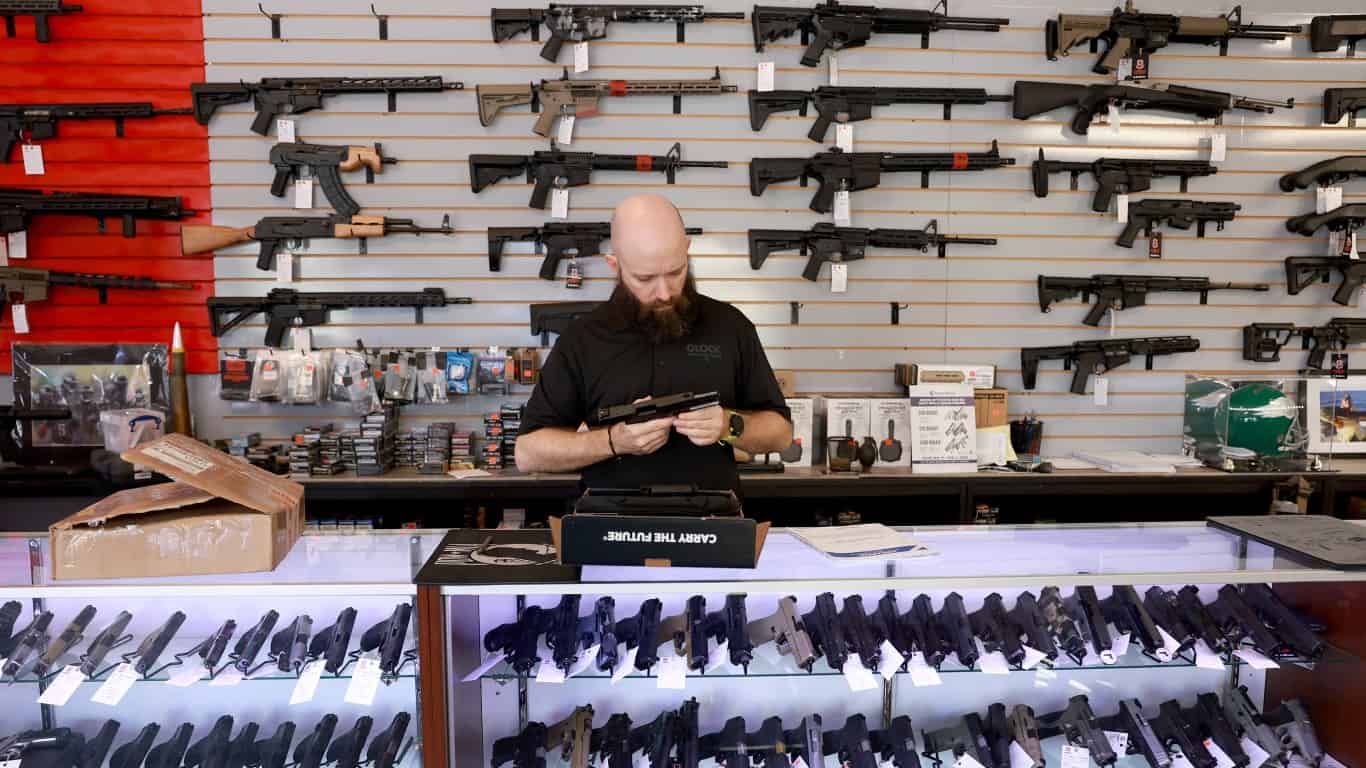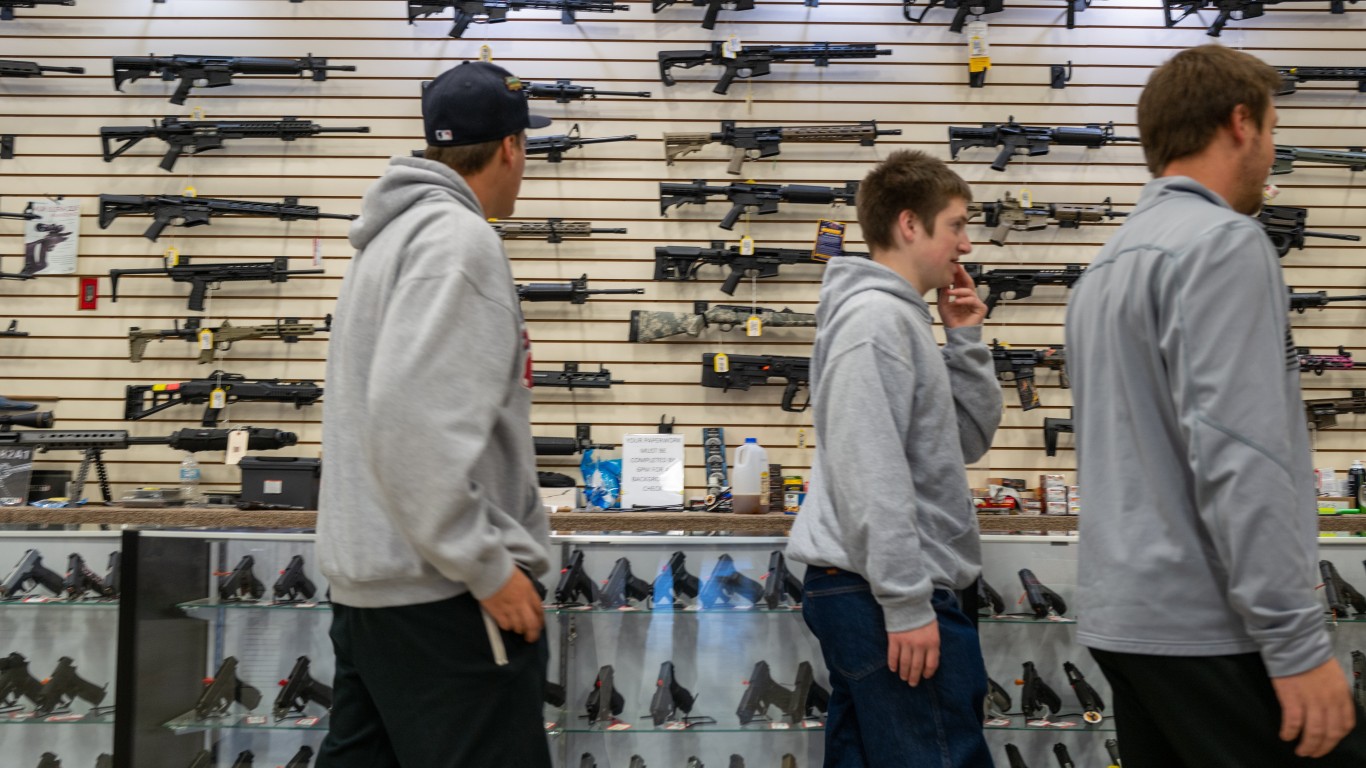
Assault-style firearms — assault rifles in particular — have surged in popularity in recent years. According to the Bureau of Alcohol, Tobacco, Firearms, and Explosives, more than 32.9 million rifles were manufactured in the United States between 2013 and 2022 — a 77% increase over the preceding 10-year period. Rising rifle sales were driven, in large part, by growing demand for assault-style rifles, also known as modern sporting rifles, or MSRs.
MSRs are civilian firearms built on the platform of military rifles, like the AR-15 or AK-47. According to the latest estimates from the National Shooting Sports Foundation, an industry advocacy group, nearly 70% of the 28.1 million MSRs that have been in circulation since 1990 were sold within the last 10 years. (Here is a look at how many guns Americans have bought every year since 1986.)
The appropriate balance between gun-control and gun-rights has long been among the most contentious issues in American politics — and much of the debate has centered around assault weapon regulations. Controversial not only for their association with military applications, MSRs and other assault-style weapons have also emerged as a common denominator in mass shootings across the country. According to the gun control advocacy group Giffords Law Center, assault-weapons were used to perpetrate each of the seven deadliest mass shootings in the U.S. in the last decade.
While MSRs were effectively banned in the U.S. from 1994 until 2004, the federal government no longer prohibits the sale or possession of assault weapons for eligible gun owners. However, states also have broad authority to establish their own gun regulations, and in the absence of a national policy, several states have imposed sweeping restrictions on MSRs and other assault weapons.
Using data compiled by Giffords Law Center, 24/7 Wall St. identified the 10 states that have banned assault-style weapons.
Several states on this list have had standing assault weapon bans for decades, while in others, prohibitions went into effect within the last few years. Approaches to assault-weapon restrictions vary among the states on this list. Most often, weapons are classified as assault-weapons, and are therefore banned, if they have certain features, like a second handgrip or a threaded barrel that can accept suppressors. Many of these states also ban specific firearms by name.
Levels of restriction also vary across these states, and in some of them, assault-weapon controls are not tantamount to an absolute, outright prohibition. Hawaii, for example, regulates assault-style pistols but not long-guns, like MSRs. In Washington, possession remains legal, provided owners have completed mandatory safety courses. However, the state does ban assault weapon sales, manufacturing, importing, and distribution. Each of these states also have provisions allowing residents who owned assault weapons prior to the ban to keep their firearms under certain conditions.
In addition to regulating assault weapons, the 10 states on this list have all imposed a range of restrictions that widely expand on federal gun control policy. Across these states, additional firearm regulations include universal background checks, mandatory waiting periods, high-capacity magazine bans, and permit and licensing requirements. (Here is a look at the states with the strongest and weakest gun control policies.)
Why It Matters

Gun control has long been a hot-button issue in American politics, and it remains so today. According to a June 2024 report from public opinion research company Morning Consult, 59% of American voters cite gun policy as a very important issue for the upcoming presidential election. Lately, the gun policy debate has centered largely around assault weapons, which are proven to be far deadlier than other firearms in active-shooter scenarios. While most of the country has adopted a hands-off approach to regulating assault-weapons, several states enacted laws that effectively prohibit these military-style firearms.
California

- Year ban first went into effect: 1989
- Assault weapon restrictions: Possession, manufacture, sale, gifting, transport, import
- Exceptions to ban: Lawful ownership of weapon prior to ban and subsequent registration
- Assault weapon definitions: Specific models and firearms with one or more specific features
- Types of banned assault weapons: Rifles, shotguns, and pistols
Connecticut

- Year ban first went into effect: 1993, expanded in 2013
- Assault weapon restrictions: Possession, sale, gifting, transport, import
- Exceptions to ban: Lawful ownership of weapon prior to bans with certification
- Assault weapon definitions: Specific models and firearms with one or more specific features
- Types of banned assault weapons: Rifles, shotguns, and pistols
Delaware

- Year ban first went into effect: 2022
- Assault weapon restrictions: Possession, manufacture, sale, transfer, receipt
- Exceptions to ban: Lawful ownership prior to June 20, 2022, transfer to family member
- Assault weapon definitions: Specific models and firearms with one or more specific features
- Types of banned assault weapons: Rifles, shotguns, and pistols
Hawaii

- Year ban first went into effect: 1992
- Assault weapon restrictions: Possession, manufacture, sale or other transfer, barter, trade, gift or acquisition
- Exceptions to ban: Lawful ownership prior to July 1, 1992 and subsequent registration
- Assault weapon definitions: Firearms with two or more specific features
- Types of banned assault weapons: Pistols only
Illinois

- Year ban goes into effect: 2023
- Assault weapon restrictions: Possession, manufacture, sale, import, deliver, purchase
- Exceptions to ban: Lawful ownership prior to ban and registration before Jan. 1, 2024
- Assault weapon definitions: Specific models and firearms with some specific features
- Types of banned assault weapons: Rifles, shotguns, and pistols
Maryland

- Year ban first went into effect: 1994, expanded in 2013
- Assault weapon restrictions: Possession, sale, transfer, purchase, receipt, transport
- Exceptions to ban: Lawful ownership and registration of assault pistol prior to Aug. 1, 1994 and lawful ownership of assault long gun before Oct. 1, 2013
- Assault weapon definitions: Firearms with two or more specific features
- Types of banned assault weapons: Rifles, shotguns, and pistols
Massachusetts

- Year ban first went into effect: 1994
- Assault weapon restrictions: Possession, sale, transfer
- Exceptions to ban: Lawful ownership prior to Sept. 13, 1994
- Assault weapon definitions: Specific models and firearms with one or more specific features
- Types of banned assault weapons: Rifles, shotguns, and pistols
New Jersey

- Year ban first went into effect: 1990
- Assault weapon restrictions: Possession, manufacture, transport, shipping, selling, disposal of
- Exceptions to ban: Officially licensed owners, lawful ownership prior to May 1, 1990 with subsequent registration
- Assault weapon definitions: Specific models and firearms with some specific features
- Types of banned assault weapons: Rifles, shotguns, and pistols
New York

- Year ban first went into effect: 2013
- Assault weapon restrictions: Possession, manufacture, transport, disposal of
- Exceptions to ban: Lawful ownership prior to Jan. 15, 2013, registered before Jan. 15, 2014
- Assault weapon definitions: Firearms with one or more specific features
- Types of banned assault weapons: Rifles, shotguns, and pistols
Washington

- Year ban first went into effect: 2023
- Assault weapon restrictions: Sale, manufacture, import, distribution
- Exceptions to ban: Possession permitted for eligible residents, contingent on completion of safety training courses
- Assault weapon definitions: Specific models and firearms with some specific features
- Types of banned assault weapons: Rifles, shotguns, and pistols
Travel Cards Are Getting Too Good To Ignore (sponsored)
Credit card companies are pulling out all the stops, with the issuers are offering insane travel rewards and perks.
We’re talking huge sign-up bonuses, points on every purchase, and benefits like lounge access, travel credits, and free hotel nights. For travelers, these rewards can add up to thousands of dollars in flights, upgrades, and luxury experiences every year.
It’s like getting paid to travel — and it’s available to qualified borrowers who know where to look.
We’ve rounded up some of the best travel credit cards on the market. Click here to see the list. Don’t miss these offers — they won’t be this good forever.
Thank you for reading! Have some feedback for us?
Contact the 24/7 Wall St. editorial team.
